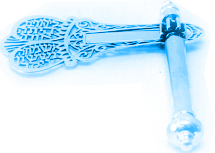Boo the Villain & Cheer the Hero
The arch villain of the Purim story, says the Sage Rava, was a master of incitement through slander. What is recorded in Megillas Esther (3:9) is only the tip of the iceberg of this vicious Jew-hater's tirade intended to cool relations between the king and the Jewish exiles and to incite to commit genocide.
"Yeshno am echad - there is one nation" is how Haman begins his pitch. This, explains Rava, was a response to the king's initial reluctance to embrace Haman's proposal for a final solution to his Jewish problem. "I am afraid," said Achashverosh, "that their G-d will punish me, just as He punished those before me who tried to destroy this people."
"Yeshno" was Haman's reassuring answer. The letters making up the word "yeshno" can be read and pronounced in more than one way. The simple meaning is "there is." But on an interpretive drush level, this word can be read as "yoshanu;" Haman reassured the king that he need not fear Divine retribution because the Jews were "yoshanu" in regard to fulfillment of G-d's commandments.
The commentaries offer two different approaches as to what "yoshanu" means. "Yoshanu" can mean "they changed," implying that the Jews deviated from the mitzvot which G-d commanded them. It can also mean "they slumbered," which communicates an image of Jews lacking any interest in these mitzvot.
Either way, Haman intended to convince the king that the Jews were vulnerable because of their laxity in practicing the religion that had protected them against earlier oppressors.
"But they have rabbis among them who will pray for them," objected a worried Achashverosh.
"Am echad - they are one nation," replied Haman, "and their religious leaders are no more observant than the rest of the people."
Almost everything Haman said in his ensuing diatribe sounds like a forerunner of all the lies concocted by Jew-haters throughout history. However, his point regarding what makes Jews vulnerable to attack from these enemies serves as a warning for every Jewish generation, especially our own.
Judaism today suffers from both kinds of "yoshanu." There are those who wish to "change" the ancient faith - to reform or reconstruct it. Then there are those who, despite their determination to cling to tradition, are "slumbering" in their observance - going through the motions of fulfilling the commandments but lacking understanding and enthusiasm. The real crisis comes, as Haman so acutely pointed out, when those who are supposed to be the spiritual leaders join the flock rather than lead it.
Where Haman made his fatal error in assessing Jewish strength and weakness was in ignoring the impact of a true Jewish leader, Mordechai, who was capable of inspiring his people to prayer and repentance - to teach them to abandon their efforts to "change" and to rouse themselves from their "slumber." This hero of the Purim story is the prototype of Torah leaders throughout history, who have saved their people from both physical and spiritual annihilation.
 Perhaps this is all summarized
in the classic Purim song "Shoshanas Yaakov" in which
we sing "cursed be Haman who wished to destroy me; blessed
be Mordechai the Jew." Haman was certain he could destroy
the Jews, because they were no longer loyal to the Torah way of
life which had always protected them against their foes. Furthermore,
Haman saw no one among them who could steer them back to the path
of the true Jew. We curse him both for his evil intentions, and
for his denigration of our capacity to bounce back when led by
a "Mordechai the Jew." We bless Mordechai to this very
day for providing the type of leadership which enables Jews to
abandon dangerous change, wake up from their spiritual slumber
- and be saved from every enemy.
Perhaps this is all summarized
in the classic Purim song "Shoshanas Yaakov" in which
we sing "cursed be Haman who wished to destroy me; blessed
be Mordechai the Jew." Haman was certain he could destroy
the Jews, because they were no longer loyal to the Torah way of
life which had always protected them against their foes. Furthermore,
Haman saw no one among them who could steer them back to the path
of the true Jew. We curse him both for his evil intentions, and
for his denigration of our capacity to bounce back when led by
a "Mordechai the Jew." We bless Mordechai to this very
day for providing the type of leadership which enables Jews to
abandon dangerous change, wake up from their spiritual slumber
- and be saved from every enemy.






